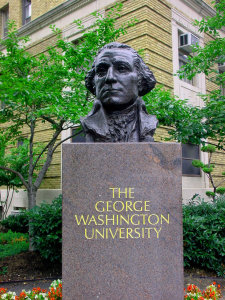In an article published in the university’s e-mail newsletter, George Washington University lauded its annual event called the Interfaith Dinner (whose original name was not mentioned in the article). The dinner event, sponsored by both the Muslim Student Association and the Jewish Student Association, was launched by these two groups after the September 11th, 2001 terrorist attacks. They were both “concerned about anti-Muslim feelings in the wake of 9/11 and joined to share in the Iftar meal that breaks the daily Ramadan fast. The tradition grew and was renamed the Interfaith Dinner” in 2009.

GW President Steven Knapp also spoke at this year’s dinner on November 19th, saying that it celebrated the theme of refugees during the current policy debate on Capitol Hill and in many states around the country. “The spirit of the Interfaith Dinner stands in proud opposition to anti-refugee sentiment and fear.” Knapp continued, “As a democracy founded on a vision not just of religious toleration, but religious freedom, we cannot allow ourselves to be divided along religious lines.” He added, “Our students have been profoundly conscious of that, and this event that we celebrate every year is a testament to the wisdom of our student body in recognizing that we cannot allow ourselves to be divided.”
The dinner began with “a musical blessing performed by graduate student Rana Shieh,” which combined the Gregorian chant with Iranian classical instruments. This, she said, helps bridge divides between religion and culture. She said, “As a musician, I’ve played with Israelis, Palestinians, Christians, Muslims, Iranians, Syrians, Turks and Europeans. Music and other arts don’t have any limitations, and they bring peace for all of us.”
Pouncing on the political tones of the refugee debate, this year’s dinner format was a stark departure from previous years’ events. Typically, speakers have addressed the audience, but this time, “participants gathered in intimate table discussions, variously discussing two questions: “When have you offered refuge?” and “When have you sought refuge?” The article also noted, “Afterward, participants were invited to share their thoughts with the larger group.”
The dinner also featured an exchange student at GW, Hala Alkhalouf, who is a Syrian national and presented her case for allowing Syrian refugees to claim asylum in the U.S. The article said the following:
“Now, as she told a crowded ballroom in the Marvin Center at GW Wednesday night, her anguish grows as she hears her countrymen blamed for acts of violence in which they had no part. Following the deaths of 129 people in ISIS-affiliated attacks in Paris last Friday, two dozen U.S. governors have suggested that they will refuse asylum in their states to Syrian refugees. The House passed a bill Thursday that suspends the program to admit Syrian refugees into the United States.
“The Syrians know what suffering is,” Ms. Alkhalouf said, close to tears. “We come from the land of suffering. We are fleeing from terrorism. This is why we’re here. There’s no way we would bring terrorism here [to the U.S.], and yet we’re being labeled as terrorists.”
“Ms. Alkhalouf spoke at the 14th annual Interfaith Journeys Dinner, a gathering of campus faith communities whose theme this year was seeking and giving refuge. Held less than a week after the Paris attacks, the dinner served as a cathartic and comforting safe space for many.”
She “ended with a plea to the United States to remember its commitment to refugees, and asked Americans “not to lose your values because of ISIS or because of anyone.”” The article continued:
“When she finished, the ballroom erupted in applause. One after another, tables of people from every faith tradition rose to their feet. “She called on us as human beings,” said attendee Gidon Feen. “It was incredibly powerful and timely.”
“Timothy Kane, associate director of inclusion initiatives in the Multicultural Student Services Center, said the event was remarkable for its displays of empathy and solidarity.
“By sharing their stories, students spoke their truth and rejected their fear of people different from themselves,” he said. “Whenever truth confronts fear, there is great reason for hope.”
As the write-up noted, the MSSC held an interfaith peace vigil from 2:30 p.m. to 3:00 p.m. last Friday on Kogan Plaza, located at the center of the university campus.










